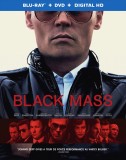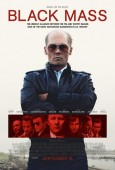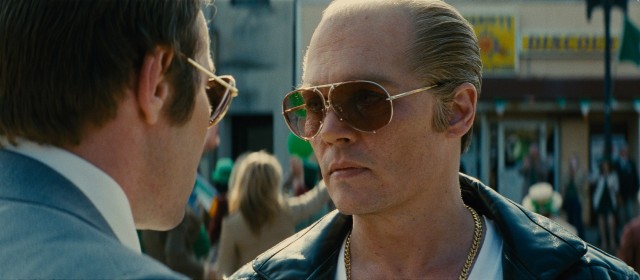Black Mass Movie Review

Black Mass is now available on home video. Read our review of the Blu-ray + DVD combo.
 |
Black Mass
Theatrical Release: September 18, 2015 / Running Time: 122 Minutes / Rating: R Director: Scott Cooper / Writers: Mark Mallouk, Jez Butterworth (screenplay); Dick Lehr, Gerard O'Neill (book) Cast: Johnny Depp (James "Whitey" Bulger), Joel Edgerton (John Connolly), Benedict Cumberbatch (Billy Bulger), Dakota Johnson (Lindsey Cyr), Kevin Bacon (FBI Agent Charles McGuire), Peter Sarsgaard (Brian Halloran), Jesse Plemons (Kevin Weeks), Rory Cochrane (Stephen Flemmi), David Harbour (John Morris), Adam Scott (FBI Agent Robert Fitzpatrick), Corey Stoll (Fred Wyshak), Julianne Nicholson (Marianne Connolly), W. Earl Brown (John Martorano), Bill Camp (John Callahan), Juno Temple (Deborah Hussey), Mark Mahoney (Mickey Maloney), Brad Carter (John McIntyre), Scott Anderson (Tommy King), Lonnie Farmer (DEA Agent Eric Olsen - Interrogator), Mary Klug (Mom Bulger), Erica McDermott (Mary Bulger), Luke Ryan (Douglas Cyr) |
Buy Black Mass from Amazon.com: Blu-ray + DVD + Digital HD • DVD • Instant Video
Once upon a time, not that long ago, Johnny Depp was a highly respected actor, regarded as one of the greatest talents of his generation. Depp had smoothly transitioned from television to cinema, garnering notice for his work in Tim Burton's Edward Scissorhands and well-received smaller films like What's Eating Gilbert Grape and Ed Wood. At first sight, Pirates seems like an obvious career highlight. Depp took what is technically a supporting role in a big-budget Jerry Bruckheimer production based on a theme park ride and had loads of fun with it. The performance was beloved by the public, which spent a barely precedented $300 million domestic and $650 million worldwide to see it in theaters. It was also admired by critics, most of whom were pleasantly surprised to enjoy such a seemingly commercial action-adventure enterprise. Depp's turn earned him his first Academy Award nomination for Best Actor, the summer attraction lingering in voters' minds unusually long and over more serious, conventionally Oscar-friendly cinema.
Depp did what any reasonable person paid $10 million for five months of fun, exciting, fulfilling work would do: he took up Disney's offer to make another. His salary doubled for 2006's Dead Man's Chest, the first of back-to-back sequels, which became only the third movie ever to cross the $1 billion mark at the global box office. Depp had already cashed in his newfound stardom and family appeal on Charlie and the Chocolate Factory and similar big paydays were to be had on Pirates threequel At World's End and Alice in Wonderland, for which he earned $50 million for a supporting role.
In this time, Depp evolved into essentially the world's most expensive children's entertainer. The promise of his early films had given way to a willingness to don outrageous costumes and make-up while adopting a funny voice. Depp's Disney and Burton movies had turned him into a cultural icon worldwide, in the process amassing him a large enough fortune to buy his own private island in the Bahamas.
Nothing lasts forever, though, and people began to tire of his shtick when he returned to the Pirates well for a fourth outing with mostly new personnel shortly before his 50th birthday. The movie handily set a franchise low domestically, while still becoming the actor's third Disney movie to enter the billion dollar blockbuster club globally. Although foreign moviegoers couldn't resist the prospect of Depp resurrecting his mascara, bandana, and dreadlocks, they have not been as receptive to his efforts outside that saga. Dark Shadows, The Lone Ranger, and Transcendence all struck out commercially, each a bigger flop than the one before it. This past January, Depp reached a new low with Mortdecai, the evidently miscalculated R-rated screwball comedy Depp dropped out of The Grand Budapest Hotel to make. This year, only one movie released in 2,000+ theaters (Zac Efron's We Are Your Friends) performed worse.
What Depp desperately needs -- and what 2016's Alice and 2017's Pirates sequels certainly cannot give him -- is redemption. To that end, here is Black Mass, a true crime drama that sees Depp doing some of his first adult-oriented serious acting in quite some time. Depp transforms himself physically to resemble the notorious Boston criminal Jimmy "Whitey" Bulger. Depp's makeover is dramatic enough to render him unrecognizable for moviegoers not watching the trailer closely enough. His receding golden white hair is slicked back. Whitey and his Irish-American crew, the Winter Hill Gang, run South Boston, the neighborhood called "Southy" by its residents. Having served close to a decade in jail, Whitey is back in power in the mid-1970s, when the film opens. With tensions brewing between the Winter Hill Gang and the Italian-American crime family that has typically claimed North Boston, Whitey is approached by FBI agent John Connolly (Joel Edgerton) about becoming an informant. Cringing at the notion of being a rat, Whitey reconsiders after realizing he can use this allegiance strategically to protect his gang and eliminate potentially threatening other ones.
The movie shows us just how deadly and exacting Whitey Bulger is. A long-trusted confidante gets slightly intoxicated and acts out of line. He is whacked. Whitey's partner (Fifty Shades of Gray's Dakota Johnson) is briskly dropped after she reacts to their son's upsetting medical diagnosis.
Adapted from the book by Dick Lehr and Gerard O'Neill, the film's interest in Bulger's ruthlessness is matched by its concern for the corruption of Connolly, a married lawman content with his old neighborhood and not above taking a handout, falsifying information, and doing exactly what Whitey wants him to do.
The third film directed by Scott Cooper (Crazy Heart, Out of the Furnace), Black Mass is slow but compelling. The film is well-cast and absorbing. Character actors like Dazed and Confused's Rory Cochrane and "Breaking Bad"'s Jesse Plemons shun vanity and gain weight to portray Whitey's altogether and believably unglamorous associates. Others like Benedict Cumberbatch, Kevin Bacon, Adam Scott, and Corey Stoll swallow their pride to fill roles less substantial than the ones they typically take. Everyone is sacrificing for a greater good, in this case to do justice to a story of a criminal whose name may be more (in)famous than his deeds.
Those waiting for a big knockout punch never get one. The movie plods along, most arrestingly with a cathartically comic, likely imagined dinner that pays homage to Joe Pesci's most quotable Goodfellas exchange. Few of the crimes dramatized really get under your skin, though one involving a young prostitute (Juno Temple) comes close. One gathers that Cooper and screenwriters, American first-timer Mark Mallouk and UK veteran Jez Butterworth (Edge of Tomorrow, Get On Up, the upcoming Spectre) aren't interested in playing free with the facts. But they also aren't too interested in capturing the flavor of the time and place. A single scene set in a strobe light-flashing disco hall reminds us we're in the '70s and a framework of testimony from Bulger's aged associates gives us an idea of where this is going. But even if Cooper displays enough ambition and desire to do this justice, we miss the sensory stimulation and immediacy of superior crime movies like Goodfellas and American Hustle.
Depp seems to fall just short of a performance that could win him an Oscar. Depending on what is to come, though, he could very likely pick up his fourth nomination in the Best Actor category. It seems safe to pencil him in for one of the Golden Globes' five Best Actor in a Drama slots too, whether or not star power is a factor. Seeing Depp tackle a complex real-life figure in a movie for adults is an encouraging sign that he is ready to return to the serious acting that first made him stand out. That he will follow this up with not one but two unnecessary, big budget, effects-laden Disney sequels virtually drains any hope for this to be a true career resurgence. Still, it's a strong turn in a film of worth, something Depp's oldest fans have probably long been itching for.
Buy Black Mass from Amazon.com: Blu-ray + DVD + Digital HD / DVD / Instant Video
|
Related Reviews:
DVDizzy.com | DVD and Blu-ray Reviews | New and Upcoming DVD & Blu-ray Schedule | Upcoming Cover Art | Search This Site
DVDizzy.com Top Stories:
Now in Theaters: Everest • Pawn Sacrifice • Sicario • A Walk in the Woods
Johnny Depp: The Rum Diary • Transcendence • Dark Shadows • Dead Man • Fear and Loathing in Las Vegas
Joel Edgerton: Animal Kingdom • The Great Gatsby • Zero Dark Thirty | Corey Stoll: Midnight in Paris • This Is Where I Leave You
Rory Cochrane: Argo • Dazed and Confused • Empire Records | David Harbour: The Equalizer • The Green Hornet • W./E.
Crime Dramas: Goodfellas • A Most Violent Year • Kill the Irishman • Gangster Squad • American Hustle • The Counselor • The Drop
Massachusetts: The Fighter • Gone Baby Gone • The Verdict | Screenplay by Jez Butterworth: Edge of Tomorrow
Text copyright 2015 DVDizzy.com. Images copyright 2015 Warner Bros. Pictures, Cross Creek Pictures, and Ratpac-Dune Entertainment. Unauthorized reproduction prohibited.



